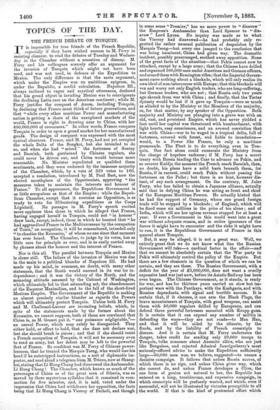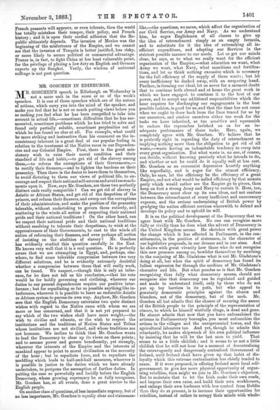TOPICS OF THE DAY • THE FRENCH DEBATE ON TONQUIN.
IT is impossible for true friends of the French Republic, especially if they have wished success to M. Ferry in resisting clamour, to read the debates of Tuesday and Wednes- day in the Chamber without a sensation of dismay. M. Ferry and his colleagues scarcely offer an argument for the invasion of Tonquin which might not have been used, and was not used, in defence of the Expedition to Mexico. The only difference is that the main argument, which under the Empire was an ambitious epigram, is, under the Republic, a sordid calculation. Napoleon always inclined to vague and mystical utterances, declared that his grand object in invading Mexico was to reinvigorate the declining Latin race on the American continent ; while M. Ferry justifies the conquest of Anam, including Tonquin, by declaring that France must think of future generations, and that "while every other maritime Power and manufacturing nation is getting a share of the unexplored markets of the world, France is right in drawing near to China, with her 400,000,000 of consumers." In other words, France conquers Tonquin in order to open a grand market for her manufactured goods. The design of conquest was expressed with the most cynical clearness. France, said M. Ferry, had not yet occupied the whole Delta of the Songkoi, but she intended to do so, and when she had " seized " the fortresses of Sontay and Bacninh, both garrisoned by Chinese regulars, she could never be driven out, and China would become more reasonable. No Minister repudiated or qualified these sentiments, and they were endorsed by the immense majority of the Chamber, which, by a vote of 339 votes to 160, accepted a resolution, introduced by M. Paul Bert, now the elected mouthpiece of the Opportunists, approving " the measures taken to maintain the interests and honour of France." To all appearance, the Republican Government is as little scrupulous as that of the Empire ; while the Repub- lican Chamber, except that it contains an Opposition, is as ready to vote for filibustering expeditions as the Corps Legislatif. No passages in M. Ferry's speech excited more applause than those in which he alleged that France, having engaged" herself in Tonquin, could not "in honour" draw back, except, indeed, those in which he boasted that "he had aggrandised France in the Mediterranean by the occupation of Tunis," an occupation, it will be remembered, intended only "to chastise the Kronmirs," of whom no one since that moment has ever heard. The Chamber, to judge by its votes, has as little care for principle as ever, and is as easily carried away by phrases about the honour and the interest of France.
Nor is this all. The parallel between Tonquin and Mexico is closer still. The failure of the invasion of Mexico was due in the main to a political blunder of Napoleon 1IL He had made up his mind, in common, no doubt, with many other statesmen, that the South would succeed in its war for in- dependence ; and it was the victory of the North, and the menacing attitude assumed by the Cabinet of Washington, which ultimately led to that astounding act, the abandonment of the Emperor Maximilian, and to the fall of the short-lived Mexican Empire. The Government of the Republic is making an almost precisely similar blunder as regards the Powers which will ultimately protect Tonquin. Unless both M. Ferry and M. Challemel-Lacour are inventing beliefs, which, in spite of the statements made by the former about the Kroumirs, we cannot suppose, both of them are convinced that China is, as M. Granet put it, " une puissance n6gligeable,"— an unreal Power, which may safely be disregarded. They either hold, or affect to hold, that she dare not declare war, lest she should break in pieces ; and that if she should resist a French occupation of Tonquin, it will not be necessary even to send an army, but her defeat may be left to the powerful fleet of France. So confident was M. Ferry of Chinese power- lessness, that he treated the Marquis Tseng, who would lose his head if he outstripped instructions, as a sort of diplomatic im- postor, and read aloud a telegram from M. Tricou,now at Shang- hai, stating that Li Hung Chang had disavowed the Ambassador. Li Hung Chang l The Chamber, which knows as much of the personages of China as of the great men of Siberia, was so moved by these mysterious syllables that it remained in com- motion for five minutes, and, it is said, voted under the impression that China had withdrawn her opposition, the facts being that Li Hung Chang is Viceroy of Pecheli, and though in some sense "Premier," has no more power to " disavow " the Empress's Ambassador than Lord Spencer to " dis- avow " Lord Lyons. No inquiry was made as to what; the Viceroy had disavowed—he had probably only re- gretted the rather unusual publication of despatches by the Marquis Tseng—but every one jumped to the conclusion that war being imminent, China had given way. The dramatic incident, possibly prearranged, soothed away opposition. None of the great facts of the situation—that Pekin cannot now be attacked, except by a large army; that the Chinese have drilled and organised 100,000 men under American and German officers, and armed them with Remington rifles; that the Imperial Govern- ment cares nothing about a blockade, which will only realise its own ideal of non-intercourse with Europe; that this blockade will vex and worry not only English traders, who are long-suffering, but German traders, who are not ; that Russia only two years ago shrank from war with China ; and finally, that the Tartar dynasty would be lost if it gave up Tonquin—were so much as alluded to by the Ministry or the Members of the majority, or, for that matter, by any speaker of the Opposition. Both majority and Ministry are plunging into a grave war with an old, vast, and persistent Empire, which has never yielded a foot until her capital was threatened with bombardment, with light hearts, easy consciences, and an avowed conviction that war with China—war to be waged in a tropical delta, full of fortresses, covered with forest, and liable to inundation— would, to a Power like France, be only a maritime promenade. The Fleet is to do everything, even in Ton- quin. One fact alone could exonerate the Ministry from the charge of hopeless rashness ; if M. Ferry has a secret treaty with Russia binding the Czar to advance on Pekin, and so recover Kuldja the moment the French reach Bacninh, then, no doubt, his plans have a solid basis beneath them, for Russia, if in earnest, could reach Pekin 'without passing the fortresses on the Peiho ; but there is no hint, however dis- tant, of any such arrangement. On the contrary, M. Jules Ferry, who has failed to obtain a Japanese alliance, actually said that in defying China he was acting as front and chief of the European Maritime Powers. He actually hinted that he had the support of Germany, whose one grand foreign. trade will be stopped by a blockade ; of England, which will be fined some six millions in the price of tea alone ; and of India, which will see her opium revenue stopped for at least a year. If ever a Government in this world went into a great war without adequate reason, and in entire ignorance of the forces it might have to encounter and the risks it might have to run, it is the Republican Government of France in this quarrel about Tonquin.
Bat, it may be alleged, it is not a great war. Well, we entirely grant that we do not know what line the Russian Government will take—a cardinal factor in the affair—and that we cannot be absolutely certain that the War party in Pekin will ultimately control the policy of the Empire. But there are a few elements in the question of which we can be certain, and they are these. The Russian Government, with a deficit for the year of £3,000,000, does not want a cruelly expensive land war just now, before its Asiatic Railway has been even begun. The Chinese Government, as it stands, is ready for war, and has for thirteen years carried on slow but im- portant wars with the Panthays, with the Kashgaris, and with Russian dependants, with signal and terrible success. It is certain that, if it chooses, it can arm the Black Flags, the brave mountaineers of Tonquin, with good weapons, can assist them with 50,000 regulars drilled by Europeans, and can defend three powerful fortresses mounted with Krupp guns. It is certain that it can expend any number of militia in defending the ways—they are not roads—to Man Hao, and that it will be aided by the climate, by the floods, and by the liability of French conscripts to disease. And it is certain that M. Ferry underrates the danger, takes credit for sending only 10,000 troops to Tonquin, talks nonsense about Anamite allies, who are just like Bengalees, and rejected Admiral Jaurdguiberry's most seriously-offered advice to make the Expedition sufficiently large-30,000 men was, we believe, suggested—to ensure a decisive campaign. It follows that unless Russia moves, of which there is no sign, and unless China gives way, which she cannot do, and unless France developer a Clive, the one form of genius not natural to her, the Republic has entered on a long, troublesome, and expensive campaign, in which conscripts will be profusely wasted, and which, even if successful, will not be illustrated by victories perceptible to all the world. If that is the kind of protracted effort which French peasants will approve, or even tolerate, then the world has totally mistaken their temper, their policy, and French history ; and it is upon their cordial adhesion that the Re- public ultimately depends. The invasion of Mexico was the beginning of the misfortunes of the Empire, and we cannot see that the invasion of Tonquin is better justified, less risky, or more likely to secure political or commercial advantage. France is, in fact, to fight China at her least vulnerable point, for the privilege of placing a low duty on English and German exports up the Songkoi. Verily, the wisdom of universal suffrage is not past question.







































 Previous page
Previous page